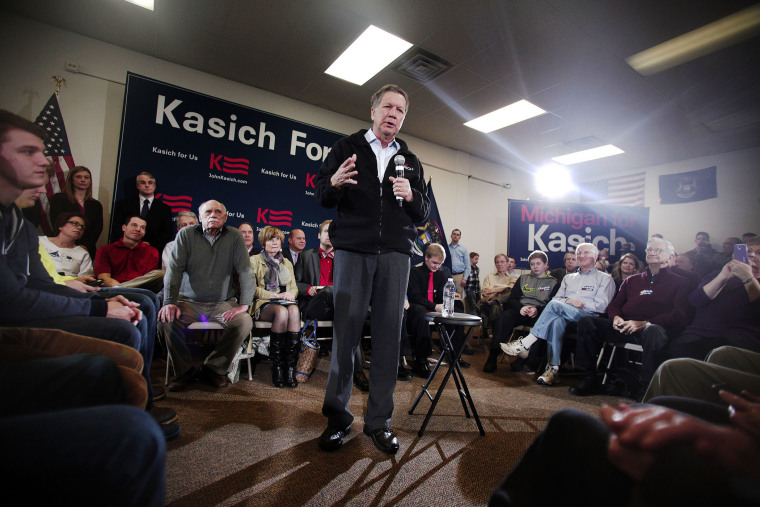At a campaign event in South Carolina last week, Republican presidential hopeful John Kasich, fresh off his second-place finish in New Hampshire, heard from a woman who didn't have health coverage. The Ohio governor was confused.
"I don't know why you don't have health insurance because there is a program now through the exchange," Kasich reportedly told the woman.
Of the six remaining presidential candidates, Kasich is the only one who says things like this. Confronted with a voter without access to affordable care, the governor is supposed to start blaming President Obama, even if that doesn't make sense, before launching into a fiery diatribe about "Obamacare." Instead, Kasich simply reminded the South Carolina woman how easy it is to get insured -- even if that means working within the Affordable Care Act system.
The Columbus Dispatch had a good report the other day, noting that some of the governor's rivals are using this approach to undermine his candidacy.
The race for the Republican presidential nomination erupted in anger as Gov. John Kasich accused Jeb Bush of "trashing" his opponents following the former Florida governor's criticism of Kasich using federal dollars to expand health coverage to low-income people. [...] Bush provoked the battle Wednesday when he told a gathering in suburban Charleston that by accepting federal money to add coverage to low-income people, Kasich was making "more and more people dependent upon government."
Kasich responded that while he supports repealing the ACA, "expanding Medicaid at this point, bringing our dollars back is working. It's saving money and it's saving lives. And that's what really matters at the end of the day."
Except, this kind of thinking is so wildly out of step with contemporary Republican politics, it's a near-perfect summary of why Kasich is all but certain to lose.
For the Ohio governor -- a conservative Republican who only appears moderate when compared to the other five GOP presidential candidates -- it's best to evaluate policies like Medicaid expansion on their efficacy. He embraced this aspect of the Affordable Care Act; it's "working"; it's "saving money"; it's "saving lives"; those results are "what really matters."
Not to put too fine a point on this, but Republicans have spent seven years convincing themselves of the exact opposite. Whether or not a policy works, the argument goes, isn't nearly as important as the policy's partisan implications, ideological purity, and effects on the next election cycle.
The whole "post-policy" thesis exists for a reason.
As for Kasich, his focus on New Hampshire paid real dividends, and his second-place finish was impressive given the circumstances. But there are limits to running as the Adult In The Room and his position on health care policy serves as a reminder that the Ohioan is unlikely to duplicate his Granite State success elsewhere.
